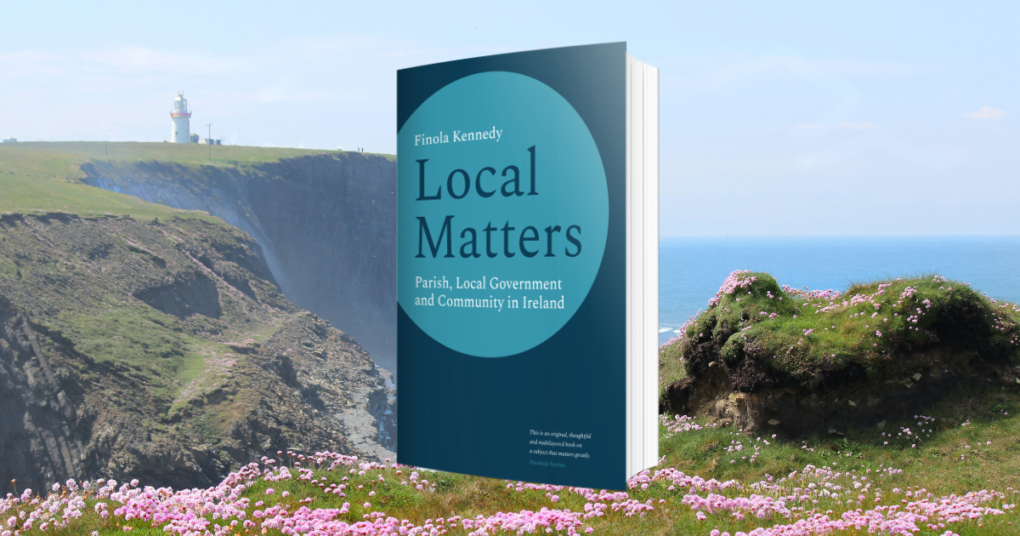Local Matters. Parish, Local Government and Community in Ireland
Finola Kennedy
Institute of Public Administration, Dublin,
2022
223 pages
ISBN: 978-1910393420
In Ireland today, there is much concern about parish life and the crisis of the parish. Discussion focuses on the decline in priest numbers and Mass attendance in an increasingly secularised society and on the pressure for amalgamations of parishes and even dioceses. There is also much reflection on our centralised State and weak local government, on the reduction in local amenities and on the concentration of power and resources around Dublin and the larger cities.
A distinctive contribution of this book is that it links these two sets of issues. Are there consequences for the wider community, the author asks, because of the decline in parishes? Is social capital, with its network of social relationships, being lost? Finola Kennedy also reflects on the relative weakening of local government and asks if a better balance can be struck between local communities, local government and the State and if parishes have a role to play in achieving such a balance.
This book looks at the parish landscape and the history of the parish system, and points out that European parishes historically had a role in both civil and ecclesiastical administration. The author considers trends in Mass attendance and reception of the sacraments, and looks at parish groups such as pastoral councils, choirs and the Society of St Vincent de Paul. She also reflects on the “branching out” that has happened from parishes, notably through the schools.
Her well-informed chapter on local government notes that, by international standards, Irish local authorities have fewer functions than local authorities in many other countries. She highlights the damaging Government decision in 1977 to abolish domestic rates, a key source of income for local authorities. A 2019 study found that 8 per cent of public spending was accounted for by Irish local authorities – the equivalent figure in 23 EU countries was 23 per cent. The book highlights the importance of local government and suggests that our weak local government is damaging for local democracy.
This book provides well-researched statistics on a wide range of subjects, from priestly ordinations over time to civil marriage rates to births outside marriage – 37.6 per cent of total births in 2017. The emphasis is more on such statistical trends, case studies and practical examples than on theoretical arguments for championing the local.
However, the author does examine key concepts and principles like social capital and subsidiarity. She reflects on the social capital represented by voluntary organisations in Ireland and argues that if it is to be developed in a manner which strengthens communities, robust local authorities embedded in local communities will be needed, that central government cannot fill the gaps on its own, and there should also be scope for parishes to play a role. The author also looks at how parishes build social capital. There are references to parish-based community projects, such as those of the Jesuits in Ballymun or the Dominican-founded Tallaght Welfare Society, which seeks to build community services and outreach in Tallaght.
The chapter on local government looks somewhat briefly at the subsidiarity principle championed – along with solidarity and other principles – by Catholic social teaching. In my view, this principle strengthens arguments for the local and merits emphasis, particularly in Ireland, where, as the 2007 report of the Task Force on Active Citizenship suggested, there is a perceived democratic deficit, with some communities and citizens feeling powerless to influence decisions.
Italian scholars have distinguished between “horizontal” and “vertical” subsidiarity. Horizontal subsidiarity, arguably the more important dimension, affirms the right of social groups to act and to take initiatives and relates to the links between society and the State. Within the operations of the State, “vertical” subsidiarity highlights the need for State delivery at the lowest possible level and is also the dimension of subsidiarity which applies in the EU context.
Giorgio Vittadini, an Italian expert, has maintained that subsidiarity is another word for “freedom”. Its rationale comes from philosophical arguments relating to human autonomy and dignity. These arguments, which go back to Aristotle, stress the capacity of the human person to give something to others, maintain that human freedom is necessary for self-fulfilment and that freedom is expressed, for example, in the associations which human beings set up together, often in the local community.
This book will be a useful resource on important recent trends affecting parish and local life. Dr Kennedy is the author of an acclaimed biography of Frank Duff and of a major study on family policy and has extensive research experience and that is reflected in her wide-ranging examination of contemporary issues relating to “local matters” in Ireland. The book also draws on numerous interviews, for example, with Bertie Ahern, John Bruton and Rev. Trevor Sargent.
The author makes a good case that parishes can forge links with non-Church bodies such as local authorities and that this could lead to collaboration in tackling local problems, such as those related to housing and homelessness.
Finally, many excellent developments are clearly happening in Irish parishes. It is therefore appropriate that one chapter focuses on “renewal” and examines various positive trends, including the strong sense of community of immigrant parish groups and the significant contribution of parish pastoral centres. In my view, one important source of renewal will be the growing appreciation in Ireland that parish structures, while important, are ultimately a means to the ends of growth in faith in Christ, faith formation and community solidarity and that structures must serve those ends.
About the Author: Tim O’Sullivan
Tim O’Sullivan taught health care policy at the IPA and completed a PhD in UCD on the principle of subsidiarity.

